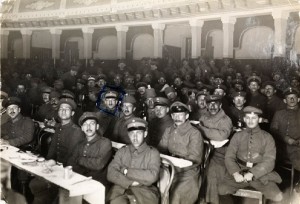Theresia Ziehe recently invited us to take a closer look at Fred Stein’s photograph “Newspaper Hat.” Now her co-curator Jihan Radjai presents another photograph that the two of them—as well as very many of our facebook fans—are particularly fond of: “Little Italy” (New York, 1943).
My Favorite Photograph: “Little Italy”
My Favorite Photograph: “Newspaper Hat”
Theresia Ziehe, curator of the exhibition “In an Instant. Photographs by Fred Stein,” explains in the following video clip why she especially likes Fred Stein’s photograph “Newspaper Hat” (New York, 1946):
In World War I
The Festival of Liberation at the Front
Yesterday evening, Monday, 14 April 2014, was the start of the eight-day Passover festivities. These kick off each year with the first Seder, the name of which derives from the Hebrew word seder, meaning order, because a particular ritual sequence is observed the entire evening.
The ritual Seder program is laid down in the Haggadah, an often beautifully illustrated book. (Incidentally, some especially precious Haggadot are currently on display in our special exhibition “The Creation of the World” and our director of archives recently described in his blog why even a nondescript Haggadah might be of great value to a museum.) Traditional texts and songs are recited from the Haggadah. Symbolic dishes and drinks deck the tables, ready to be consumed at specific moments during the evening.

German soldiers celebrate Passover in the occupied town of Jelgava (near Riga). © Jewish Museum Berlin, photo: anonymous. Donated by Lore Emanuel
But why is this night different from all other nights? This is a question that Jews all over the world ask themselves year after year at the Seder dinner. The answer is: it is the festival of liberation, for it commemorates the Israelites’ exodus from slavery in ancient Egypt. Everyone is supposed to feel, each year, as if she or he personally is about to leave Egypt. As a token of tribute to this new-won freedom, people comfortably recline while eating and drinking—for to take this position was the prerogative solely of free individuals in antiquity, not of slaves. → continue reading